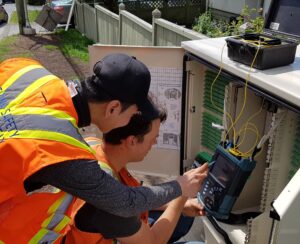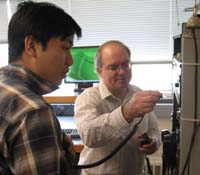Overview
Elevate Your Career with the Digital Communications and Wireless Technologies Program
Unlock the gateway to the dynamic world of telecommunications with our cutting-edge Digital Communications and Wireless Technologies program. Designed to equip you with essential skills and comprehensive knowledge, this program ensures you become a versatile and sought-after professional in the fast-evolving telecommunications industry.
Comprehensive Curriculum for a Future-Ready Professional
Year One:
- Foundation in Electrical and Electronic Theory: Build a robust understanding of the basics.
- Structured Cabling Systems: Master copper and fiber optic cabling techniques with hands-on training, emphasizing practical skills.
- Networking Fundamentals: Learn modern networking with state-of-the-art switches and routers.
- Linux Operating System: Gain foundational skills in one of the most widely used operating systems.
- Voice Network Fundamentals: Delve into the design and basics of voice communication systems.
Year Two:
- Advanced Networking Concepts: Elevate your networking expertise and prepare for the Cisco Certified Network Associate (CCNA) Exam.
- Voice over Internet Protocol (VoIP): Work with Mitel telecommunications hardware to understand and implement VoIP systems.
- Wide Area Network (WAN) Design: Utilize Computer-Aided Design (CAD) for modifying Outside Plant (OSP) drawings.
- Wireless Communications Systems: Explore RF communication theory, antenna systems, GPS, and location tracking.
- Practical Wireless Applications: Apply your knowledge in real-world scenarios with the RF Applications course.
- Internet of Things (IoT): Engage in an IoT project using Raspberry Pi and Arduino microcontrollers.
Industry-Relevant Training and Experience
- Hands-On Skills: Our program prioritizes practical learning, ensuring you gain relevant hand skills essential for the industry.
- Industry Placement: Gain valuable experience through a short practicum, connecting you with potential employers.
High Demand, High Reward
Telecommunications skills are in high demand. If you have a passion for technology, and a desire to thrive in an exciting industry, our program is your launchpad to a rewarding career.
Why BCIT?
A BCIT diploma is a mark of excellence. Employers recognize our graduates as highly skilled, knowledgeable, and ready to contribute immediately. Our alumni and their employers consistently praise the effectiveness of our training in preparing graduates for the workforce.
Exceptional Faculty – Learn from industry veterans who are not only passionate about teaching but also bring real-world experience to the classroom. Our instructors have extensive industry backgrounds and maintain robust local networks through strategic student practicum placements and active involvement in our program advisory committee.
Excellent Labs – Gain hands-on experience in cutting-edge electronics labs that equip you with the practical, job-ready skills needed to excel. Our labs provide an immersive learning environment that bridges theoretical knowledge with real-world application.
Exciting Career Prospects – Unlock a world of career opportunities in high-demand fields. You could be performing bench testing, troubleshooting, and repairing critical communications equipment for prestigious organizations like the Department of Fisheries and Oceans or the RCMP. Alternatively, embark on a dynamic career with telecommunications service providers, managing and maintaining advanced voice, data, and entertainment systems, including cable and satellite communications. Our graduates are sought after for their ability to keep vital communication systems operational and efficient.
Advance Your Career with Degree Completion – Elevate your credentials with BCIT’s Bachelor of Technology Management degree. With your BCIT diploma and one year of related work experience, you can seamlessly transition into our part-time program. This flexible degree allows you to continue working while you enhance your expertise and open doors to new career opportunities. Join us at BCIT and take the next step towards achieving your professional goals.
Transform your future with the Digital Communications and Wireless Technologies program at BCIT—where innovation meets expertise.
- Next up Entrance Requirements
Entrance Requirements
If you’re interested in a career as in the telecommunications industry, please review the program details, carefully check the entrance requirements, and then submit your application.
Spend-A-Day with us
Want to learn more about our program before you apply? Come spend-a-day with us. You’ll meet students and instructors, and get a hands-on feel for what the program is about.
If you have questions regarding the entrance requirements or the application process, visit Admission & Registration or if you want to discuss the program in more detail, contact the Department Head at 604.432.8223.
Application processing
Open to applications beginning October 1st (or next business day).
Applications are considered for a specific intake; this program does not carry a wait list from year to year.
Entrance requirements
Applicants must meet all entrance requirements prior to applying to this program and will be accepted on a first-qualified basis as long as space remains. When available intakes are full, qualified applicants are wait-listed.
If you are uncertain or don’t meet the requirements, we strongly recommend you complete any applicable Trades Entry Assessments before applying.
- English language proficiency: Category 3 – English Studies 12 (50%) or equivalent
- Math: one of the following:
- Pre-Calculus 11 (60%) or
- Foundations of Math 11 (60%) or
- Workplace Math 11 (60%) or
- Other acceptable BC and Yukon courses or
- BCIT Math Trades Entry Assessment
International applicants
This program is available to international applicants.
Study permit: A valid BCIT study permit is required prior to starting the program.
Students enrolled in this program must complete the mandatory work component to qualify for graduation. A co-op work permit is required prior to starting the work component.
Post-graduation Work Permit (PGWP) eligibility: This program meets the eligible field of study requirement (CIP) and is eligible for students to apply for a PGWP.
(CIPC: 9.0702)
Apply to program
To submit your application:
- Include proof of meeting all entrance requirements.
- Convert all transcripts and supporting documents to PDF files.
- Have a credit card ready to pay the application fee.
Apply Now
Scheduled Intakes
September each year.
myCommunication
Within two business days of submitting your completed application, BCIT will send a message to your personal and myBCIT email addresses. All correspondence regarding your application will be posted to your online myCommunication account at my.bcit.ca. We will send you an email when a new message is posted. It is important to watch for these emails or regularly check your account online.
You can expect to receive communication concerning the status of your application within four weeks.
- Go back Overview
- Next up Advanced Placement
Advanced Placement
Conditions
You may be eligible to apply to an advanced level of the program through direct entry. Please note that applications are considered based on:
- Complete applications: you must show proof that you have completed (or are registered in) all requirements to be considered.
- Competitive entry: if the number of applicants exceeds available seats, BCIT will accept those deemed to have the best opportunity for success.
- Seat availability: confirmation may not be available until approximately one week before the term begins.
Direct entry
If you are new to the program but have completed the BCIT Electronics Technician Common Core Certificate, you may be eligible for direct entry to Term 2 (January start).
BCIT accepts complete applications starting October 1st (or next business day).
Submit the following with your online application:
- Proof of meeting all general entrance requirements
- Proof of completion of the BCIT Electronics Technician Common Core Certificate or an equivalent certificate from another recognized institution
- Course-by-Course Self-Assessment Form [PDF]
Ready to submit your application? Apply now.
- Go back Entrance Requirements
- Next up Costs & Supplies
Costs & Supplies
Find out how much you will need to complete your Digital Communications and Wireless Technologies Diploma!
The information below will help you determine the cost of taking the program, and will assist you in developing a budget for your two years of study. If you have concerns about being able to afford the program, please visit Financial Aid to learn how you may benefit from financial assistance.
Tuition fees
Use our tuition estimator to find tuition and fees for this program.
For more information on full-time tuition and fees, visit:
Books & supplies
$900 (general estimated cost, and subject to change)
Financial assistance
Financial assistance may be available for this program. For more information, please contact Student Financial Aid and Awards.
- Go back Advanced Placement
- Next up Courses
Courses
Explore Your Learning Experience
Immerse yourself in a dynamic blend of classroom instruction, hands-on labs, and expert-led lectures that bridge theory with real-world application. Our curriculum is designed to equip you with the knowledge and skills to master RF, Routing and Switching, satellite, navigation, and cellular communications systems—using industry-leading equipment in cutting-edge facilities. Your practical training will take place in specialized labs, including:

- Data Lab – Work at your own dedicated workstation, exploring computer operating systems and data transfer. Gain hands-on experience with an Ethernet LAN, a representative WAN, and Cisco routers for internet routing and network management.
- Cabling Lab – Train with the latest industry tools for cable terminations, installations, and system testing, ensuring you’re job-ready from day one.
- Telephony Lab – Build expertise in telecommunications infrastructure while working with advanced Mitel systems.
- RF Lab – Get hands-on with industry-standard radio frequency equipment, including a communications monitor, frequency counter, digital DMM, and essential electronics bench tools. Work directly with real-world wireless communication systems, including two-way mobile and trunk radios, a wireless LAN, a spread spectrum radio network, a microwave repeater site, and a functional cell site—giving you firsthand experience with the technologies that power modern communication networks.
With small class sizes, you’ll form strong professional relationships, collaborate closely with peers, and gain the technical expertise needed to excel in the fast-paced world of communications technology.
You will complete a three-week practicum working as a technician for a local company, gaining experience and employment contacts.
Class hours
0800-1500, Monday through Friday.
Program matrix
| Term 1 (15 weeks) | Credits | ||
|---|---|---|---|
| DCOM 1500 | Technical Skills | 6.0 | |
| DCOM 1510 | DC Circuits | 6.0 | |
| DCOM 1520 | AC Circuits | 6.0 | |
| DCOM 1530 | Analog Electronics | 6.0 | |
| DCOM 1540 | Digital Electronics | 6.0 | |
| Term 2 (20 weeks) | Credits | ||
| DCOM 1550 | Network Essentials | 6.0 | |
| DCOM 1560 | Structured Cabling | 8.0 | |
| DCOM 2500 | Telecommunications Essentials | 6.0 | |
| DCOM 2510 | RF Principles 1 | 6.0 | |
| DCOM 2520 | Routing and Wireless Networks | 6.0 | |
| DCOM 2530 | Linux Fundamentals | 4.0 | |
| DCOM 2540 | Voice Networks | 4.0 | |
| Term 3 (15 weeks) | Credits | ||
| DCOM 2550 | Professional Skills | 4.0 | |
| DCOM 3500 | Enterprise Networking and Security | 6.0 | |
| DCOM 3510 | RF Principles 2 | 8.0 | |
| DCOM 3520 | Transmission Lines and Antennas | 6.0 | |
| DCOM 3530 | Navigation and Location | 6.0 | |
| Term 4 (20 weeks) | Credits | ||
| DCOM 2560 | Fiber Optics and Telecommunications Design | 8.0 | |
| DCOM 3540 | VoIP Systems | 6.0 | |
| DCOM 4500 | Wide Area Network Design and Maintenance | 4.0 | |
| DCOM 4510 | Managing Connected Devices | 6.0 | |
| DCOM 4520 | RF Applications | 10.0 | |
| DCOM 4530 | Practicum | 4.0 | |
| Total Credits: | 138.0 | ||
Transfer credit
Do you have credits from another BC/Yukon post-secondary school? Do you want to know if they transfer to courses here at BCIT? Check out BCIT's Transfer Equivalency Database to find out.
- Go back Costs & Supplies
- Next up Program Details
Program Details
Students in the Digital Communications and Wireless Technology program learn the theory, standards, measurement instruments, test equipment and standard practices of the telecommunications industry. As a student in the program, you will learn to:

- Install, program, configure, maintain and repair telephone switches and systems
- Install, administer, maintain and diagnose faults in data transmission systems
- Install, test and repair fiber optic and high-speed local area network (LAN) cables
- Install, configure, test and document data communication systems and navigation systems
- Maintain, evaluate the performance of, and troubleshoot radio frequency (RF) communication systems
- Understand digital cellular communication systems
- Use, calibrate and maintain industry standard tools and test equipment
- Bench test, isolate faults and repair RF equipment
- Communicate effectively with customers and co-workers
Program length
Two years, full-time.
Grading
The passing grade for each course is 60%.
Program delivery
In person: This program is delivered on campus.
Program location
Burnaby Campus
3700 Willingdon Avenue
Burnaby, BC
- Go back Courses
- Next up Graduating & Jobs
Graduating & Jobs
Explore the exceptional career opportunities in Telecommunications!
What’s in it for you?
A rewarding job as a Technician
Your BCIT diploma opens the door to an exciting career as a technician – a technical expert who works in a team to solve problems, and is relied upon to install, configure, maintain, and repair electronic equipment.
An edge in the job market
A BCIT diploma shows potential employers that you are accomplished, focused, and serious about your chosen career path. Employers know that you have both theoretical knowledge and practical skills, and that you can immediately start contributing. Both graduates and employers say that BCIT was incredibly instrumental in preparing grads for work.
A broad range of employment possibilities
The job market for telecommunications technicians is strong. As a graduate of the program, you will have opportunities with large and small companies in a variety of roles. Most graduates start out in hands-on technical roles and there are many opportunities to move into technical sales or managerial roles if you are interested.
Some of the many employers of BCIT Digital Communications and Wireless Technologies graduates include:
- Go back Program Details
- Next up Faculty, Advisors & Staff
Faculty, Advisors & Staff
Our instructors are committed to keeping their skills current, and regularly attend advanced training courses.
You will also learn from people who are active in local industry. Guest lecturers introduce the latest technology, and are available to answer your questions.

The advisory board of industry experts meets biannually to review the program focus and content, ensuring that our program and your skills are up-to-date.
Faculty
Dave Hogg, DiplT, PID, MA, AScT
Department Head
Tel: 604-432-8223
Email: dave_hogg@bcit.ca
Rick Davidson, DiplT, PID, Med, AScT
Tel: 604-431-4949
Email: rdavidson2@bcit.ca
Mike Lowe, DiplT, PID
Tel: 604-412-7464
Email: mlowe16@bcit.ca
Blair Thompson-Jendrysek, DipT, PID
Tel: 604-456-8157
Email: blair_thompson@bcit.ca
Gareth Williams
Tel: 604-432-8458
Email: gareth_williams@bcit.ca
Staff
Viktoriia Kovalova, PhD, P.Eng.
Associate Dean
Tel: 604-432-8976
Email: viktoriia_kovalova@bcit.ca
Mary-Anne Pangan
Administrative Assistant
Tel: 604-456-8052
Email: maryanne_pangan@bcit.ca
Advisory committee
Jeff Brown
Head of Canadian Operations, Zayo
Darren Hamaoki
Customer Service Technician, Mackay Communications Inc
C/M Jason A. Jaschinsky
A/Director Information Technology, RCMP “E” Division
Jason Krause
General Manager, OSP, OBS, Greenfield Build, Wireless, Ledcor Technical Services
Jeff Lewis
President & General Manager, 4th Utility Inc.
Colin Leyh
Field Services Supervisor, Shaw Communications
Quincy Mittertreiner
Retired, Formerly NEC Canada, Inc
Doug Peterson
Manager, MDT Technical Services, Inc.
Ralph Ryan
Service Manager, BC Communications Inc.
Craig Sexton
Manager, TELUS Wireless Implementation and Operations
Benjamin Staggs
Marine Services Manager BC, Mackay Marine Canada
- Go back Graduating & Jobs
- Next up Contact Us
Contact Us
Spend-A-Day with us
Want to learn more about our program before you apply? Come spend-a-day with us. You’ll meet students and instructors, and get a hands-on feel for what the program is about.
If you want to discuss the program in more detail, contact the Department Head at 604.453.4089.
Questions or comments?
- Go back Faculty, Advisors & Staff
- Next up Subscribe
Subscribe
Sign up to receive updates, invitations to events, and information about BCIT and your program.
We promise not to spam you, we won’t share your personal information, and you can unsubscribe at any time.
- Go Back Contact Us
Programs and courses are subject to change without notice.